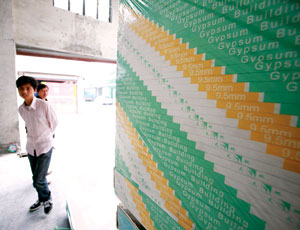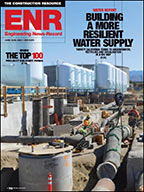As reports grow of health problems and metal corrosion suspected of coming from U.S. imports of Chinese-made drywall, federal agencies are moving ahead on a multipronged investigation of the material. Initial results of laboratory and in-home tests are due in August and September.

The Consumer Product Safety Commission told Senate Appropriations Committee leaders on July 6 it has received 608 reports of Chinese drywall problems from 21 states and the District of Columbia. That is a sharp increase since May 21, when CPSC testified at a Senate hearing it had recorded 320 drywall reports from 16 states. Most are from Florida, Louisiana and Virginia.
CPSC is leading the multi-agency federal drywall probe. One part of the investigation aims to determine whether Chinese drywall’s composition differs from that of U.S.-made products.
Federal agencies and contractors also are running a range of tests. A U.S. Environmental Protection Agency team is analyzing 14 samples of uninstalled imported and domestic drywall to determine what organic and inorganic compounds, metals and other properties are present. EPA is to finish the analysis by Aug. 21.
Under a contract awarded June 9, the Lawrence Berkeley National Laboratory is carrying out “chamber studies” on the drywall samples to identify gases they emit and isolate the gases from emissions from other household products, such as carpets and paints. Phase one will be finished by late August. CPSC also will complete a preliminary health assessment by mid- to late September. Phase two of the chamber studies will look at “higher-emitting materials” found in phase one.
Environmental Health and Engineering Inc., Needham, Mass., was awarded a contract on June 1 to conduct indoor-air sampling in 50 homes. That work is expected to be completed by late August.
Sen. Bill Nelson (D-Fla.), who has pushed for action on drywall, is pleased agencies are “finally looking at the core issues,” an aide says. But Nelson also has introduced a bill directing CPSC to determine whether a drywall safety standard is needed. The bill also mandates an “interim ban” on drywall with more than 5% organic compounds by weight.



Post a comment to this article
Report Abusive Comment